Women’s History Month: Setting a high bar for research, collaboration and teaching

According to the American Association of University Women (AAUW), women make up the majority of nontenure-track lecturers and instructors across institutions, 44% of tenure-track faculty and 36% of full professors. Their unique perspectives, collective knowledge and energetic passion for research and teaching are making a difference in their institutions, communities and disciplines, and inspiring their students.
UNC Charlotte is fortunate to have among its faculty women researchers whose curiosity, professionalism and commitment to excellence set a standard for their peers to emulate and offer an example to which their students may aspire. Here are a just few UNC Charlotte researchers who represent the exceptional women of the faculty:
Janaki Gooty: Redefining Leadership
Department of Management, Belk College of Business • Organizational Science, College of Liberal Arts & Sciences
Dr. Gooty’s advice to students: “Never limit yourself in imagination nor in action. Your job is to dream and execute. Flame your passions, a strong work ethic is non-negotiable, and be strategic in when and how you express your thoughts and feelings in the workplace. This is an important lesson I had to learn early on as a female scholar.”
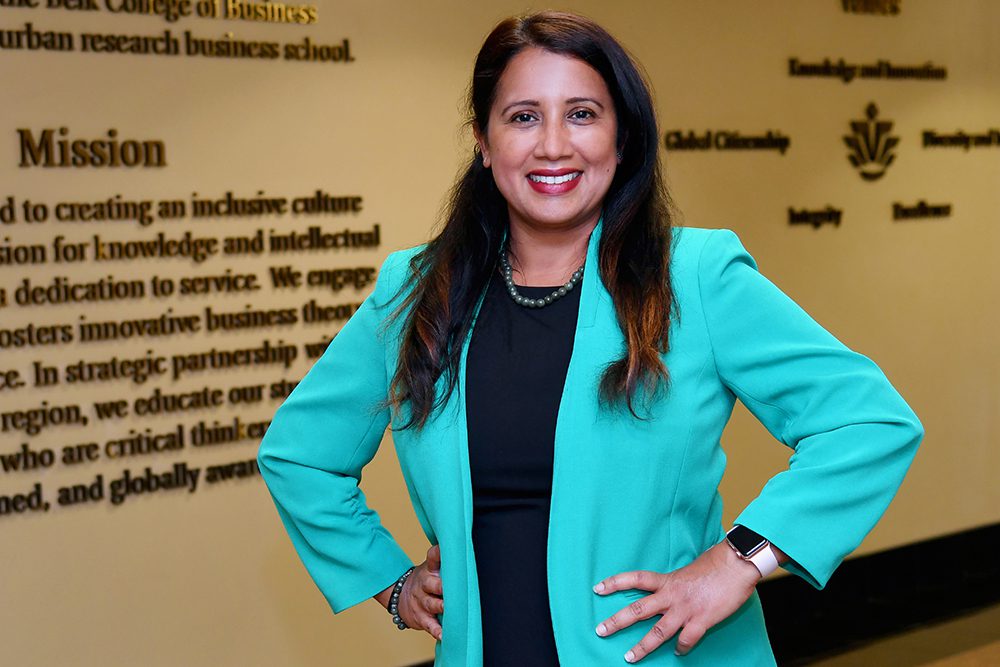
Janaki Gooty and her colleagues are on a path to redefining what it means to be a leader. Through an eight-week study conducted during the peak of the COVID-19 pandemic, Gooty, along with colleagues George Banks and Scott Tonidandel, and doctoral students Liana Kreamer and Andrew McBride, are finding that conventional definitions of leaders might be outdated and ill-fitting for the diverse global workforce. This was punctuated by two major crises of the last year: COVID-19 and the racial injustice protests following George Floyd’s killing.
“Our definitions of leadership originate in military studies and focus on white male leaders,” Gooty said. “In leader training and development programs, when women and people of color are trained to imitate white-male centric behaviors, it does not set them up for success. To make matters more complex, we romanticize leaders and cast them as superheroes, thus making leadership almost unattainable for women and people of color.
“Our latest findings reveal that while male and female leaders share some commonalities in how they lead, such as with clarifying tasks, they also differ in some pretty important ways,” she continued. “For example, female leaders report that they notice and manage the emotions or feelings of others more so than do male leaders.”
Gooty’s research program is in three areas of leadership: developing inclusive definitions of leadership, the role of relationships and emotions in effective leadership and the development of methodological techniques to study leadership more rigorously. She aims to develop an inclusive, robust leadership science that can be used to train and develop the next generation of diverse business leaders.
Gooty, who holds a bachelor’s degree in electrical engineering from Mysore, India, took an unusual path toward her current career trajectory. While she started out in a graduate program in computer engineering, she quickly pivoted to an MBA as she realized that she enjoyed working with people as well as analytical methods, and a career in business would allow for both. She switched to an MBA program without knowing what lay ahead but a mentor in the MBA program encouraged her to pursue a doctorate as he said, “You have a mind for research, Gooty.”
“Mentoring is so important. I would not be here today if not for great mentors along the way,” Gooty said. “Women not only need mentors but we need advocates – the difference is mentors offer professional, emotional and social support while advocates will go to bat for you. I hope to pay that forward as so many of my faculty colleagues, including Steven Rogelberg and David Woehr here at UNC Charlotte, have done that for me early in my career.”
Jennifer Webb: Mind-body Health
Department of Psychological Science and Health Psychology, College of Liberal Arts & Sciences
Dr. Webb’s advice to students: “Even if you’re hesitant, I encourage you to take a chance and reach out to a faculty member if you have a sense this is someone you could connect with and share your desire to be involved in research. Take advantage of faculty office hours. Many faculty members are committed to help students learn more about opportunities.”
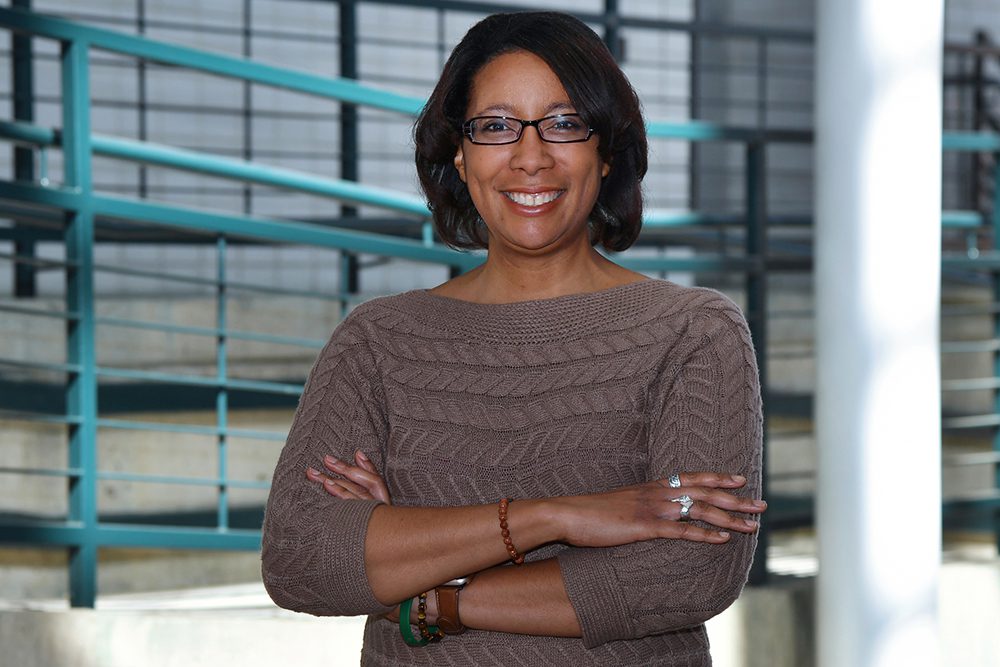
A recent study in Jennifer Webb’s MIND-BATCH lab found that eating behavior and body image improve when participants engage in a size-affirming yoga practice. Webb, a clinical health psychologist, investigates weight-related stigmatization and mind-body connections that affect appetite, eating, metabolism and weight. She currently is investigating mindfulness- and self-compassion-based approaches to promoting positive body image, intuitive eating, enjoyable movement and healthy weight regulation among ethnically diverse women during the college, pregnancy and postpartum transitions.
Her lab recently conducted a four-week study where college women of higher weight participated in an online yoga practice that was accessible for women of various body shapes and sizes. African American women comprised 30 percent of the study’s completers. Women in the study noted multiple benefits of the size-affirming yoga practice including increased body appreciation, body functionality awareness, body functionality appreciation, and less body shame relative to a waitlist control condition.
When Webb was a pre-med student at Harvard University with an interest in neuroscience, her mentor introduced her to other professions that matched her curiosity. During her graduate work in psychology, Webb focused on discrimination stress in the context of eating behavior and racial disparities in cardiometabolic health. She saw that Black women had become what she describes as “the poster-child for obesity,” without taking into consideration the important socio-contextual factors (such as intersectional stressors such as racism, sexism and weightism) that contributed to higher weight in this population.
At UNC Charlotte several years ago, she began critiquing “obesity” and the BMI as problematic constructs being increasingly used to determine one’s overall health and recognized the need to take the exclusive focus off a person’s weight and shift the focus to wellness regardless of one’s size. Webb’s current research has a holistic, social justice approach with a focus on a person’s overall well-being. Much of her research focuses on women, especially racially and ethnically diverse women.
Rachel Dickey: Building Community
School of Architecture, College of Arts + Architecture
Dr. Dickey’s advice to students: “Architecture needs diverse candidates in the discipline to provide unique voices and perspectives. It is important to have both a passion for art and for science but also the dedication to put in the hard work and the curiosity to explore new technology and innovation.”
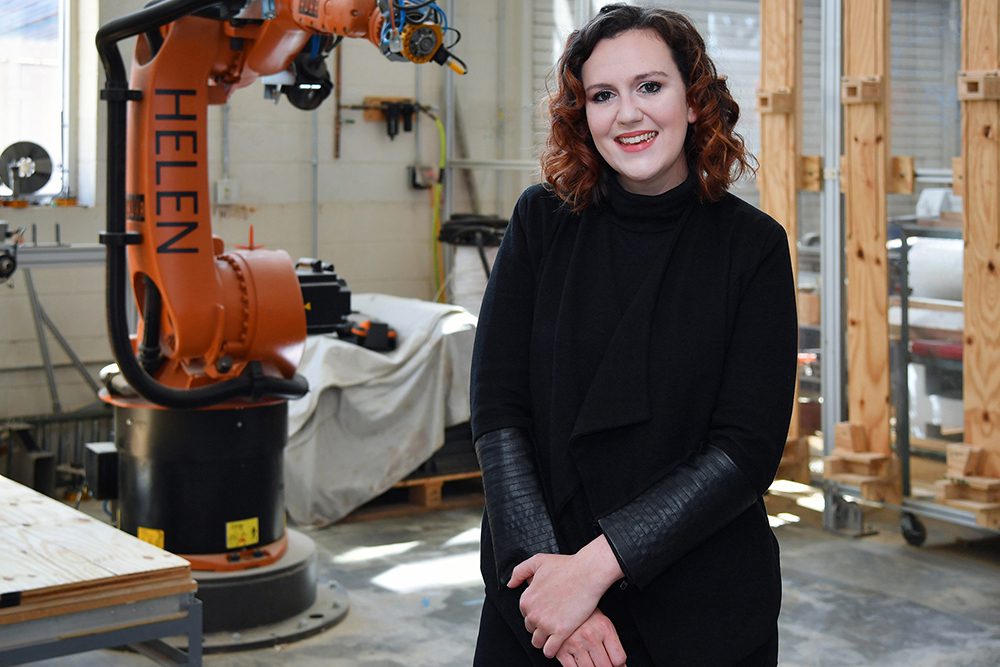
What began as research with an emphasis on new materials, advanced fabrication and interactive elements has evolved into an active architectural design and public art practice that incorporates a team of undergraduate and graduate students and alumni of UNC Charlotte’s College of Arts + Architecture.
Rachel Dickey, principal of Studio Dickey, conducts research and applications that often deal with human experiences and engage the community. Her team’s most recent installation – COVID Confessionals – came in response to the global pandemic and its impact on social interactions. Installed recently at a light rail stop in Charlotte, the public art incorporates interactive lights that bounce off iridescent shields to encourage physically distanced interaction among passers-by.
Currently, her team is in the design phase of The Bleachery Heritage Project, to be installed at the former site of the Rock Hill Printing & Finishing Company (locally known as The Bleachery) in Rock Hill, South Carolina. The design will pay tribute to the old and the new by commemorating the old bleachery as an important part of the community’s history while recognizing the rise of technology businesses in the area. The public installation will include interactive rocking chairs that light up as the public engages with them. Research for the project includes searching historical archives and exploring former cloth printing patterns and printing and finishing elements.
Tara Cavalline: Concrete Solutions
Department of Engineering Technology and Construction Management,The William States Lee College of Engineering
Dr. Cavalline’s advice to students: “The future is bright for this profession and is great for those interested in problem solving and helping the community. The courses can be challenging. If you come to a bump in the road, don’t give up. Reach out to your professor and keep trying. The Lee College of Engineering faculty and staff are genuinely interested in your success, and will provide support to help you reach your career goals.”
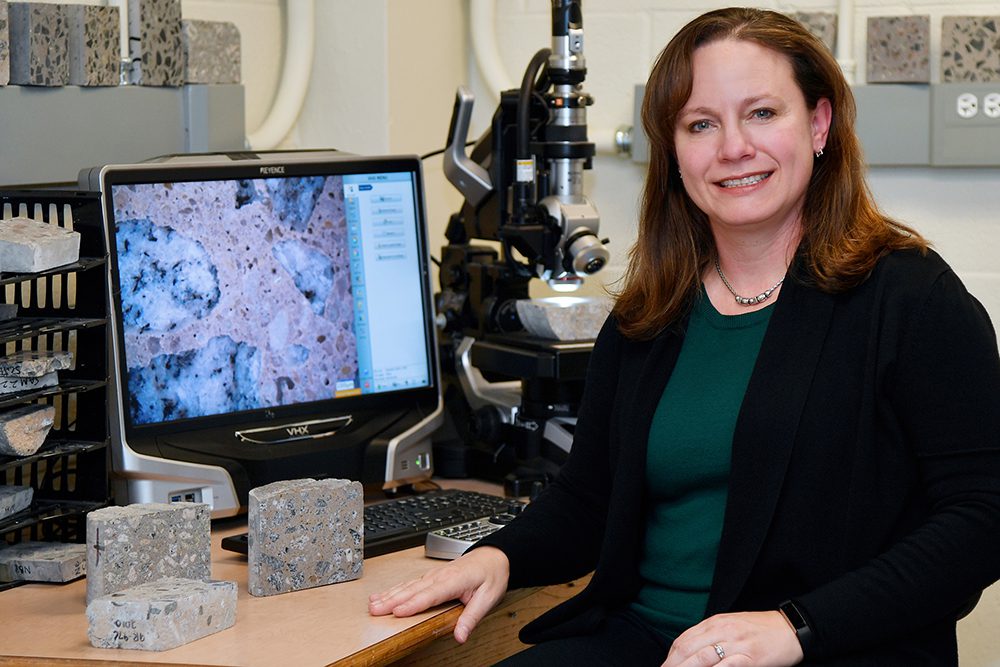
Tara Cavalline and her colleagues are working to make the world a better place for future generations by researching and developing more sustainable materials for public infrastructure. Much of Cavalline’s research involves optimizing concrete and cementitious materials to support improved durability, reduce environmental impact and promote longer service lives for concrete bridges and pavements.
This research comes at a time when the State of North Carolina recently issued $700 million in “Build NC” bonds and when the N.C. Department of Transportation is facing rising costs for its 2020-2029 State Transportation Improvement Program and a drop in revenue due to an economic downturn resulting from the COVID-19 pandemic.
Working with Brett Tempest, Civil and Environmental Engineering, Cavalline and her team support the use of advanced concrete materials, mixtures and testing technologies to help agencies design and construct concrete infrastructure that uses more recycled and sustainable materials, is economical and requires less maintenance. With concrete as the world’s most widely used material (after water), this research has important implications in North Carolina as well as in emerging societies.
Cavalline’s research and teaching also focuses on quality management in construction. In work for the Federal Highway Administration, funded through the National Concrete Pavement Technology Center, Cavalline recently led the development of a publication on quality control for concrete paving. She also has performed research to support increased use of recycled concrete aggregates and has co-authored a practitioner’s reference guide for recycling concrete pavement materials.
“I am proud of our work and feel fortunate to be part of a close-knit program,” Cavalline said of her colleague in the Department of Engineering Technology and Construction Management. “Along with the many others in our civil, construction and facilities management professions, our work helps to improve life for societies across the globe, giving people what they need to survive and thrive. Over the past 15 years, I’ve greatly enjoyed hearing about the exciting contributions of our alumni, and I’m proud that our program helped give them a great foundation for their careers.”
Cavalline encourages girls and young women to consider civil engineering as a viable career choice. She is involved with UNC Charlotte’s Women + Girls Research Alliance and is a volunteer with Project Scientist, where she introduces young girls to opportunities in civil engineering.
Mary Lou Maher: Collaborative Curiosity
Department of Software and Information Systems, College of Computing and Informatics
Dr. Maher’s advice to students: “The influence of role models and mentors helped me to make it. Often women in research face insurmountable barriers. It is important to find a supportive mentor.”
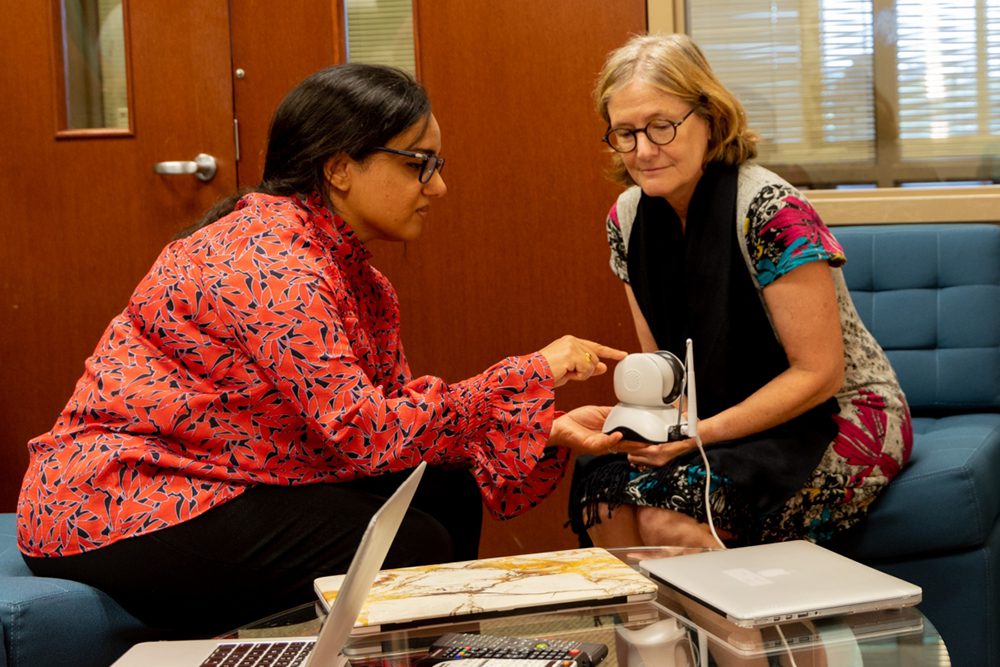
How do you increase someone’s curiosity? Mary Lou Maher seeks to answer this question and others through her computer science-focused research in education innovation and technology that supports learning.
Her current project, Pique, looks at cognitive models of curiosity to explore how novel ideas are created and develop adaptive learning technology using artificial intelligence. The project builds on models of computational creativity to develop a curiosity-driven cognitive systems approach to personalize a learning trajectory will increase curiosity as well as the learners’ intrinsic motivation and knowledge retention.
Maher, who is the director of the Center for Education Innovation in the College of Computing and Informatics, focuses her research on developing social-computational models and new technologies through collaborative systems. Much of her work can be applied to student learning and new models of classroom instruction.
Through The Connected Learner project, Maher looks at education as a social activity rather than a transmission of knowledge, where problem solving is achieved through a dialogue with others and where learning is iterative. The project, which seeks to improve inclusivity in the classroom, is funded by the National Science Foundation’s (NSF) Revolutionizing Engineering Education Program.
Maher also has received NSF funding for her project, FIRST. This project seeks to use data to tell interesting stories about students’ academic experience. By using AI analytics, the project can support individual students by capturing data when issues arise that may require advising intervention. Rather than presenting data just in sentence form, the project uses scene selection and outlier detection to produce creative storytelling of the data.
Maher’s academic career started in engineering, then architecture and design computing and more recently computer science and information studies. She completed a Ph.D. while caring for her five children. “This helped me to develop good time management because I knew I only had a certain amount of time to work between feedings and naps,” she said. “Because of this, I have developed the ability to focus and be productive.”
[Photo: Dr. Meera Sridhar and Dr. Mary Lou Maher at the SmartHome Lab in 2019]